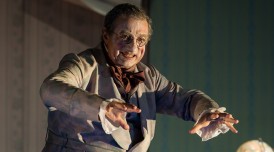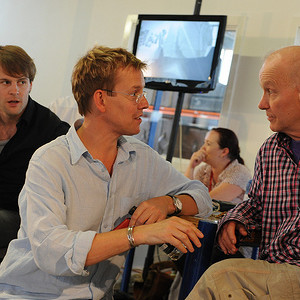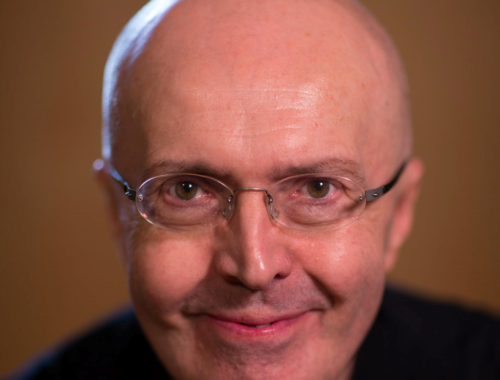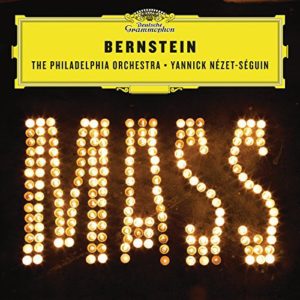Don Pasquale, Glyndebourne Festival Opera
 As Donizetti’s Overture chortles into life the scheming Dr Malatesta spirits us through the chambers of Don Pasquale’s residence, emerging through wardrobes, disappearing through wall paintings, a stealthy and surreal presence. His playthings – the characters in this popular Opera buffa – are there, too, frozen in anticipation, the Don in his bed, the lovelorn nephew Ernesto in his shambolic room, the feisty heroine Norina at her dressing table. The revolve is spinning ever faster now as if to pre-empt the ensuing chaos. Mariame Clément has caught the rhythm and ethos of the piece before a note has been sung.
As Donizetti’s Overture chortles into life the scheming Dr Malatesta spirits us through the chambers of Don Pasquale’s residence, emerging through wardrobes, disappearing through wall paintings, a stealthy and surreal presence. His playthings – the characters in this popular Opera buffa – are there, too, frozen in anticipation, the Don in his bed, the lovelorn nephew Ernesto in his shambolic room, the feisty heroine Norina at her dressing table. The revolve is spinning ever faster now as if to pre-empt the ensuing chaos. Mariame Clément has caught the rhythm and ethos of the piece before a note has been sung.
The cleverness of her elegant and pithy staging (designer Julia Hansen) lies in the stylisation where the credible is rendered incredible, where the comedy always teeters on the brink of insanity, and where characters can step out of the “frame” and seek the confidence of the audience or enjoy a quiet nervous breakdown. We, the audience, are augmented by the presence of the chorus – an entourage of powdered wigs and ivory finery – whose arrival is a wonderful late surprise (from both Donizetti and Clément) and whose role is threefold: an extension of ourselves, nosy observers of the unfolding drama, and Norina’s ever expanding household staff. In the climactic garden scene they constitute a ravishing tableau of Arcadia.
Clément is not averse, either, of elaborating the cartoonish theatricality of the opera and making a kind of operetta divertissement of the outrageous Pasquale/Malatesta patter number in act three – complete with a built-in encore we don’t see coming. Alessandro Corbelli (Pasquale) and Nikolay Borchev (Malatesta) almost lose their teeth in this one. Corbelli, who is a master of the role and the genre, now looks like a living cartoon and the way he dissolves from assertiveness to compliance in the face of Norina’s shrewishness is one of the real pleasures of the evening. But we glimpse compassion, too, as when Clément bathes the stage in a consolingly rosy glow as Norina concedes a little pity for the old fool in the hard lesson he is learning. It doesn’t last long but it’s one of many subtle shifts in text where Clément registers the truth of the moment.
Along with Corbelli, the heart of the evening lies with Danielle de Niese’s wonderfully vibrant Norina. “I’m quick and vivacious. I like to shine and to have fun”, says Norina of herself, and my goodness de Niese is as good as her character’s word. Like all natural stars, the energy comes from within and her personality is stage-filling. Of course, the role is a good fit for her, but her attention to text and the way the vocal line, the coloratura, amplifies and titillates is never merely cosmetic. Not a note is sung without an understanding of what it needs to say. Smashing.
We had an eleventh-hour replacement tenor on opening night – Enea Scala as Ernesto, replacing the indisposed Alek Shrader. He slipped easily into the proceedings having sung the role on tour last year – but work is needed to even out the production of his voice which has a disarming habit of changing complexion with register. A slightly dodgy top C appeared to emanate from another voice.
His final act lament was prefaced by a trumpet solo so redolent of The Godfather that one felt we’d repaired to Sicily. That was a measure of wonderfully stylish conducting from Enrique Mazzola who had the London Philharmonic Orchestra illuminating many such Donizetti touches – like the flute and cello combo so striking from the Overture. Don Pasquale is perfect summery fair and Mariame Clément brought it to the stage with charm, wit, and understanding.
You May Also Like

A Conversation With RICHARD TAYLOR: ‘The Go-Between’
02/09/2010
GRAMOPHONE: From Where I Sit – January 2020
29/01/2020